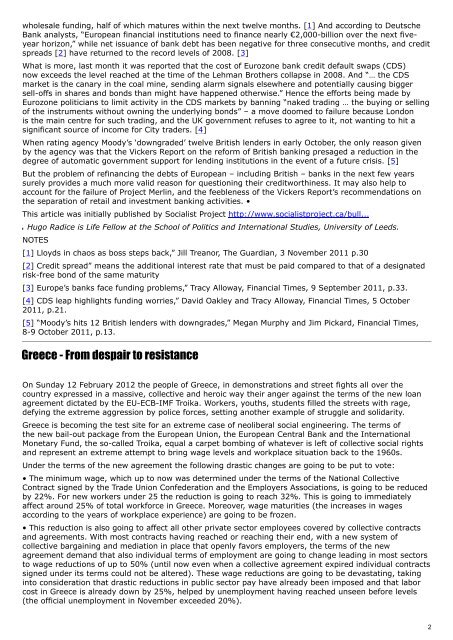download - International Viewpoint
download - International Viewpoint
download - International Viewpoint
You also want an ePaper? Increase the reach of your titles
YUMPU automatically turns print PDFs into web optimized ePapers that Google loves.
wholesale funding, half of which matures within the next twelve months. [1] And according to Deutsche<br />
Bank analysts, “European financial institutions need to finance nearly €2,000-billion over the next fiveyear<br />
horizon,” while net issuance of bank debt has been negative for three consecutive months, and credit<br />
spreads [2] have returned to the record levels of 2008. [3]<br />
What is more, last month it was reported that the cost of Eurozone bank credit default swaps (CDS)<br />
now exceeds the level reached at the time of the Lehman Brothers collapse in 2008. And “… the CDS<br />
market is the canary in the coal mine, sending alarm signals elsewhere and potentially causing bigger<br />
sell-offs in shares and bonds than might have happened otherwise.” Hence the efforts being made by<br />
Eurozone politicians to limit activity in the CDS markets by banning “naked trading … the buying or selling<br />
of the instruments without owning the underlying bonds” – a move doomed to failure because London<br />
is the main centre for such trading, and the UK government refuses to agree to it, not wanting to hit a<br />
significant source of income for City traders. [4]<br />
When rating agency Moody’s ‘downgraded’ twelve British lenders in early October, the only reason given<br />
by the agency was that the Vickers Report on the reform of British banking presaged a reduction in the<br />
degree of automatic government support for lending institutions in the event of a future crisis. [5]<br />
But the problem of refinancing the debts of European – including British – banks in the next few years<br />
surely provides a much more valid reason for questioning their creditworthiness. It may also help to<br />
account for the failure of Project Merlin, and the feebleness of the Vickers Report’s recommendations on<br />
the separation of retail and investment banking activities. •<br />
This article was initially published by Socialist Project http://www.socialistproject.ca/bull...<br />
Hugo Radice is Life Fellow at the School of Politics and <strong>International</strong> Studies, University of Leeds.<br />
NOTES<br />
[1] Lloyds in chaos as boss steps back,” Jill Treanor, The Guardian, 3 November 2011 p.30<br />
[2] Credit spread” means the additional interest rate that must be paid compared to that of a designated<br />
risk-free bond of the same maturity<br />
[3] Europe’s banks face funding problems,” Tracy Alloway, Financial Times, 9 September 2011, p.33.<br />
[4] CDS leap highlights funding worries,” David Oakley and Tracy Alloway, Financial Times, 5 October<br />
2011, p.21.<br />
[5] “Moody’s hits 12 British lenders with downgrades,” Megan Murphy and Jim Pickard, Financial Times,<br />
8-9 October 2011, p.13.<br />
Greece - From despair to resistance<br />
On Sunday 12 February 2012 the people of Greece, in demonstrations and street fights all over the<br />
country expressed in a massive, collective and heroic way their anger against the terms of the new loan<br />
agreement dictated by the EU-ECB-IMF Troika. Workers, youths, students filled the streets with rage,<br />
defying the extreme aggression by police forces, setting another example of struggle and solidarity.<br />
Greece is becoming the test site for an extreme case of neoliberal social engineering. The terms of<br />
the new bail-out package from the European Union, the European Central Bank and the <strong>International</strong><br />
Monetary Fund, the so-called Troika, equal a carpet bombing of whatever is left of collective social rights<br />
and represent an extreme attempt to bring wage levels and workplace situation back to the 1960s.<br />
Under the terms of the new agreement the following drastic changes are going to be put to vote:<br />
• The minimum wage, which up to now was determined under the terms of the National Collective<br />
Contract signed by the Trade Union Confederation and the Employers Associations, is going to be reduced<br />
by 22%. For new workers under 25 the reduction is going to reach 32%. This is going to immediately<br />
affect around 25% of total workforce in Greece. Moreover, wage maturities (the increases in wages<br />
according to the years of workplace experience) are going to be frozen.<br />
• This reduction is also going to affect all other private sector employees covered by collective contracts<br />
and agreements. With most contracts having reached or reaching their end, with a new system of<br />
collective bargaining and mediation in place that openly favors employers, the terms of the new<br />
agreement demand that also individual terms of employment are going to change leading in most sectors<br />
to wage reductions of up to 50% (until now even when a collective agreement expired individual contracts<br />
signed under its terms could not be altered). These wage reductions are going to be devastating, taking<br />
into consideration that drastic reductions in public sector pay have already been imposed and that labor<br />
cost in Greece is already down by 25%, helped by unemployment having reached unseen before levels<br />
(the official unemployment in November exceeded 20%).<br />
2









